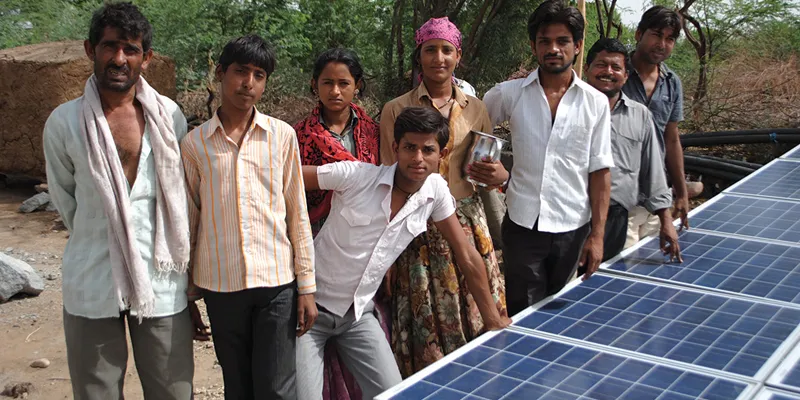Making efficient and affordable power real: 5 solar energy startups that are making it happen
This article is sponsored by Haywards 5000 Hausla Buland Academy
The last five years have seen an increased interest in the domestic solar energy sector. The government is promoting existing policies, introducing new policies and enabling more concessions for renewable energy projects, resulting in greater interest among big and small industry players as well as startups.
This new-found enthusiasm and the focus on solar energy to meet the country’s power needs is a positive step on many levels. Today, power production through coal-fueled power plants meets only 60 per cent of India’s power requirement, as the country faces fuel shortage and needs expansive coal imports to make up for this. Second, there is a shorter window of time to bring to market solar power compared to power from traditional sources. Third, there has been a decline in set-up costs, with reducing price of components. Fourth, in a relatively short time frame, solar power can cost equal or less than conventional power. Fifth, it’s a viable option for a country like India which is sun-rich, and is also a great way to bring electricity to places difficult to access in traditional power transmission. Then, there are also the evident and well-known benefits of climate protection, pollution reduction and minimal environmental impact.

Gram Power
In 2010, two engineering graduates from the University of California, Berkeley, Yashraj Khaitan and Jacob Dickinson, founded Gram Power. Two years later, the startup set up what was hailed as India’s first solar-powered smart microgrid in Khareda Lakshmipura, a small hamlet in Rajasthan. Today, the startup has made a name for itself by using smart grid technology to address electrification challenges, especially in developing nations. So far, it has brought smart grids to more than 30 remote areas in rural India and is in the process of bringing its technology to the national grid by partnering with one of India’s leading private power distribution companies.
Picoenergy
The under-served households and micro enterprises in urban and rural areas are often forced to pay a relatively huge price for lighting. Additionally, because of lack of access to electricity, they opt for inefficient sources of lighting such candles and oil lamps and AA batteries. At the outset, these may appear to be cheap, but they turn out to be expensive in the long run. Also, they are not very safe to use and their limited efficiency impacts productivity and ultimately the standard of living. For instance, children find it difficult to study beyond dusk, and there is an increased chance of fire-related accidents, among others.
Addressing this issue is Picoenergy, a social enterprise founded in 2015 by Bhushan Trivedi. Its flagship product, HELIOS aids the basic lighting and mobile phone charging needs of the underserved. Watch the video to see how Picoenergy is making access to affordable energy really simple.
Mera Gao Power
Co-founded by Sandeep Pandey, Brian Shaad and Nikhil Jaisinghani, Mera Gao Power (MGP) is another startup working in the area of microgrids. Primarily operating in Uttar Pradesh, it has served more than 150,000 people in 1,600 villages in the state. It serves off-grid villages with high quality, dependable lighting and mobile phone charging services. With its unique model MGP is able to provide service to a typical hamlet for less than $1,000, making its low-cost design the first commercially viable microgrid targeted at the rural poor. Two other key features of MGP include its fully automated design and the ability to assemble the solution with a single day of construction. All it takes is four staff members working on the installation process from morning, and by evening their services would be ready for use by the village. After that, the system generates, stores, and distributes power on its own, turning itself on and off each night automatically.
Cygni Energy
An incubatee of the Rural Technology Business Incubator (RTBI) at IIT Madras, Cygni Energy is on a mission to ‘power a billion dreams’ by venturing into new solar solutions based on technology and innovation. Venkat Rajaraman, a Stanford graduate, developed the idea of Cygni Energy. While it provides various Direct Current (DC) solutions to its clients, the startup has a wide-range of experience in managing grid connected, rooftop and decentralised PV systems. A key product of Cygni is its inverter-less solar power backup which promises 40 per cent savings in energy through intelligent use of solar, battery and energy-efficient DC equipment.
Boond Engineering
Rustam Sengupta is the founder and Chief Executive Officer (CEO) of Boond Engineering – a social enterprise that offers affordable and clean energy to rural India. Boond designs solar power centres, solar rooftop solutions, solar micro grids, and offers solar products such as power packs, home lighting systems, street lights, water pumps, water heaters, among others. Founded in 2010, with a mission to promote clean energy solutions, it offers its services primarily in Rajasthan, Uttar Pradesh, Delhi NCR and other northern states of India. As of FY15, they had implemented projects in various sectors with installed capacity of over 1500 KW, impacting more than 100,000 individuals and several small-scale enterprises.







